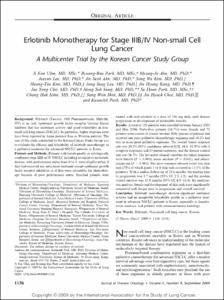KUMEL Repository
1. Journal Papers (연구논문)
1. School of Medicine (의과대학)
Dept. of Internal Medicine (내과학)
Erlotinib Monotherapy for Stage IIIB/IV Non-small Cell Lung Cancer A Multicenter Trial by the Korean Cancer Study Group
- Keimyung Author(s)
- Song, Hong Suk
- Department
- Dept. of Internal Medicine (내과학)
- Journal Title
- Journal of Thoracic Oncology
- Issued Date
- 2009
- Volume
- 4
- Issue
- 9
- Keyword
- Erlotinib; Non-small cell lung cancer; Korean
- Abstract
- Background:
Erlotinib (Tarceva, OSI Pharmaceuticals, Melville, NY) is an oral, epidermal growth factor receptor tyrosine kinase inhibitor that has antitumor activity and good tolerability in non-small cell lung cancer (NSCLC). In particular, higher response rates have been reported in Asian patients than in Western patients. The aim of this study conducted by the Korean Cancer Study Group was to evaluate the efficacy and tolerability of erlotinib monotherapy as a palliative treatment for advanced NSCLC patients in Korea.
Patients and Methods:
Patients with histologically or cytologically confirmed stage IIIB or IV NSCLC including recurrent or metastatic disease, with performance status from 0 to 3, were eligible either if they had received any anticancer treatment except epidermal growth factor receptor inhibitors or if they were unsuitable for chemotherapy because of poor performance status. Enrolled patients were treated with oral erlotinib at a dose of 150 mg daily until disease progression or development of intolerable toxicity.
Results:
A total of 120 patients were enrolled between January 2005 and May 2006. Forty-four patients (36.7%) were female and 72 patients were current or former smoker. Fifty percent of patients had received one prior palliative chemotherapy regimens and 34.2% had two or more prior palliative regimens. The overall tumor response rate was 24.2% (95% confidence interval [CI], 16.8–32.8%) with 4 complete responses and 25 partial responses, and the disease control rate was 56.7%. The favorable clinical variables for tumor response were female (P = 0.001), never smokers (P = 0.041), and adenocarcinoma (P = 0.001). The most common adverse event was skin rash (78% of which grade 3 or 4 skin rash occurred in 13.3% of the patients). With a median follow-up of 23.6 months, the median time to progression was 2.7 months (95% CI, 2.2–3.2), and the median overall survival was 12.9 months (95% CI, 6.9–18.8). By multivariate analysis, female and development of skin rash were significantly associated with longer time to progression and overall survival.
Conclusion:
Erlotinib monotherapy showed significant antitumor activity and an acceptable tolerability profile as a palliative treatment in advanced NSCLC patients in Korea, especially in females, never smokers, and patients with adenocarcinoma histology.
- Keimyung Author(s)(Kor)
- 송홍석
- Publisher
- School of Medicine
- Citation
- Ji Eun Uhm et al. (2009). Erlotinib Monotherapy for Stage IIIB/IV Non-small Cell Lung Cancer A Multicenter Trial by the Korean Cancer Study Group. Journal of Thoracic Oncology, 4(9), 1136–1143. doi: 10.1097/JTO.0b013e3181b270a7
- Type
- Article
- ISSN
- 1556-0864
- Appears in Collections:
- 1. School of Medicine (의과대학) > Dept. of Internal Medicine (내과학)
- 파일 목록
-
-
Download
 oak-aaa-2616.pdf
기타 데이터 / 239.46 kB / Adobe PDF
oak-aaa-2616.pdf
기타 데이터 / 239.46 kB / Adobe PDF
-
Items in Repository are protected by copyright, with all rights reserved, unless otherwise indicated.